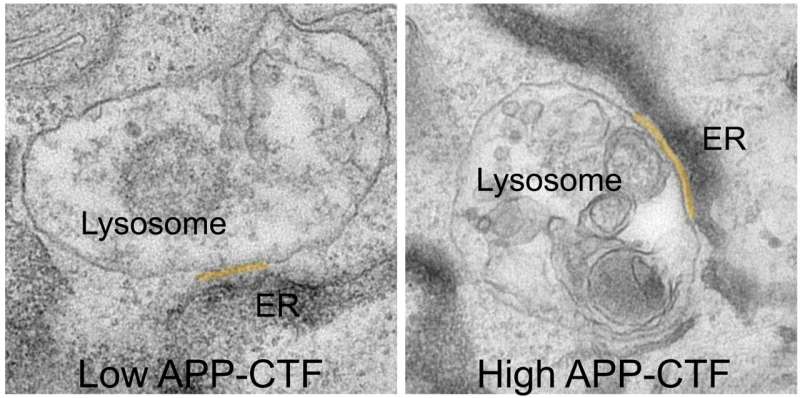New mechanism uncovered in early stages of Alzheimer's disease
Originally published by VIB (the Flanders Institute for Biotechnology) on April 15, 2024
 APP-C-Terminal
Fragments (APP-CTFs) accumulate between the endoplasmic reticulum and the
lysosomes,. Credit: VIB
APP-C-Terminal
Fragments (APP-CTFs) accumulate between the endoplasmic reticulum and the
lysosomes,. Credit: VIBAlzheimer's disease (AD) remains one of the most challenging and prevalent neurodegenerative disorders, affecting millions of individuals worldwide. In a new study published in Developmental Cell, researchers from the lab of Wim Annaert (VIB-KU Leuven) have identified a novel mechanism potentially connected to the early stages of AD. They demonstrated that a fragment of the amyloid precursor protein (APP), called APP-CTF, disrupts communication between cellular compartments crucial for calcium storage and waste disposal, which could be an early event preceding neuronal cell death.
These findings, with potential implications for the development of new AD treatments, suggest that preventing APP-CTF accumulation needs to be taken into account to develop more effective treatments.
Alzheimer's disease is characterized by the progressive loss of cognitive function, memory impairment, and behavioral changes. One of the visible features in the brains of people with Alzheimer's disease is the formation of amyloid plaques—clumps of β-amyloid (Aβ) peptides, which are degraded products of amyloid precursor protein (APP). These Aβ-fragments accumulate in neurons early in the disease, even before cognitive decline is observed.
The new research, however, suggests that there might even be earlier events happening in the AD brain before plaque formation and that the APP protein plays a role in these early stages. The mechanism behind this remained a mystery until now.
Read more

Comments
Post a Comment